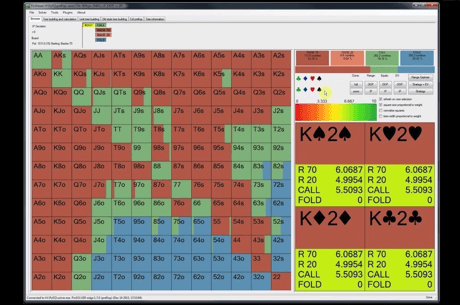Short Deck Starting Hands
Sep 26, 2018 Short deck hold’em hand rankings Image credit: Triton Poker. Santa slot. Hand rankings are different in SDHE, with a flush beating a full house. Straights hit more frequently, and if you have open-ended straight draw on the flop, you have a 45.5 percent chance of hitting the straight on the turn or river, compared to 31.5 percent in traditional Hold’em. “Short-deck” or “Six-Plus Hold ’Em” There are more useful tips in the video, so do watch it. But one thing I perhaps need to explain more is the “short deck game” that we talk about in the interview. We often like to play this game when we get together. Equity calculator for short deck and full deck hold'em poker games with hand history storage.
Playing shorthanded NL is very different than playing in a full ring game. A shorthanded game is one with six or less players at the table. Unlike the traditional 9 or 10-handed games, it doesn't usually take that big of a hand to win shorthanded.
Hand values increase as the number of players in the game decreases, therefore in a shorthanded game you are going to have to play more hands. Wv online gambling sites. This is due to the blinds going around the table faster. Hands like KQ, AJ, AT, and small pairs can be played from earlier positions than they could be at full table.
Short Deck Starting Hand Rankings
Just because hand values increase however, doesn't mean you should go broke with a mediocre hand. When going to war you should always have a hand to go to war with.
In shorthanded play it is important to be extremely observant of your opponent's tendencies and styles of play. You will be presented with many more marginal decisions in a shorthanded game because you will be forced to play less than premium hands. You don't want to sit there and play like a rock because when you do eventually make a hand, observant opponents won't pay you off.
Many more hands will be played heads-up, and won before they get to showdown. This is why it is important to have a firm handle on your opponents' styles of play. Your play in many shorthanded situations will be based on your position at the table and your opponent's tendencies as opposed to the actual strength of your own hand.
It is best if you are just starting out in NL, to stick to full ring games. Once you have a good grasp of the basics such as betting strategy, position, and the play of hands, you can then try out shorthanded games. The reason shorthanded games aren’t good for beginning players, is the amount of marginal situations a player is faced with when playing against only a few opponents.

In order to avoid as many marginal situations as possible you should generally stick to premium hands as well as the hands named above. Try not to play any marginal hands out of position, especially hands like KJ, KT, AJ, etc. These can be trouble hands, even in a shorthanded game, so it is best that they are reserved for middle to late position.
Another way to avoid sticky situations is to constantly be observing your opponents. Figure out what kinds of hands they play from what positions. If a loose player limps in and you have position on him, it's not a bad idea to raise and try and isolate him. Hopefully the blinds will fold, and if the limper calls you will have position on him throughout the hand. You can make a lot of money in shorthanded games by finding players who will call pre-flop raises and fold on the flop frequently.

Short Deck Poker Starting Hands
You must also realize that there is more variance involved in shorthanded play because of the faster nature of the game. The fact that you will be put in many toss-up situations, and the poor players at the lower and middle limits can wreak havoc on your bankroll if you aren't careful. You should be properly bankrolled to play any game regularly, but if you plan on playing shorthanded you may want to have a couple more buy-in’s available to you than a full ring game player, in the event of a downswing.
Short Deck Best Starting Hands
When playing shorthanded you must open up your starting hand standards, however not to the point where you are becoming a loose player. Try and keep yourself out of as many marginal situations as possible, and learn how your opponents play so that you can use it against them. If you play your cards, your opponents, and your position at the table efficiently, you will be successful in shorthanded games.